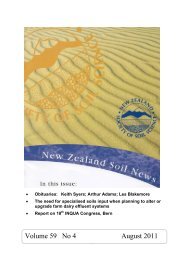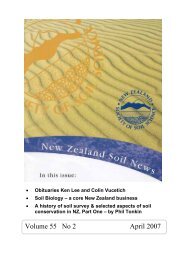Download - New Zealand Society of Soil Science
Download - New Zealand Society of Soil Science
Download - New Zealand Society of Soil Science
Create successful ePaper yourself
Turn your PDF publications into a flip-book with our unique Google optimized e-Paper software.
1. Teaching would be done by the Department <strong>of</strong> <strong>Soil</strong> <strong>Science</strong> at Lincoln College.<br />
2. The paper initially would be <strong>of</strong>fered at Stage I level but with Chemistry I as a prerequisite. This<br />
was unusual because it meant that, despite being a stage I paper, it could not be taken until a<br />
student’s second or third year.<br />
3. The paper would be in two parts (a) Pedology and (b) The Physical and Chemical Nature <strong>of</strong><br />
<strong>Soil</strong>s with three hours <strong>of</strong> lectures and a three or four laboratory each week to be held in a<br />
Geology Department laboratory <strong>of</strong>fered by Pr<strong>of</strong>essor Gage. In addition, three or four days <strong>of</strong><br />
field trips were proposed.<br />
4. Estimated initial enrolments were “probably as high as 35”.<br />
5. One Lecturer (or Senior Lecturer), one demonstrator and one laboratory technician would be<br />
required.<br />
6. Funding. A non-recurring setting-up grant <strong>of</strong> $10,000 for equipment and materials and $500 for<br />
library resources, and a recurring grant <strong>of</strong> $1500 for running expenses were foreshadowed.<br />
The Faculty <strong>of</strong> <strong>Science</strong> approved it for submission to the University <strong>of</strong> Canterbury Pr<strong>of</strong>essorial Board<br />
for inclusion as a potential new development in their 1970 – 1974 Quinquennial Grant proposals.<br />
Soon after his appointment Pr<strong>of</strong>essor McKelvey gained approval for the Bachelor <strong>of</strong> Forestry <strong>Science</strong><br />
(BForSc) degree to be a four year degree with a structure <strong>of</strong> two intermediate years followed by two<br />
pr<strong>of</strong>essional years <strong>of</strong> study. <strong>Soil</strong> <strong>Science</strong> would be taken in a student’s second year because a<br />
prerequisite <strong>of</strong> Chemistry I was required for the paper (that is students had to have passed Chemistry I<br />
before being allowed to enroll in the <strong>Soil</strong> <strong>Science</strong> paper).<br />
Forestry studies proper (that is the first pr<strong>of</strong>essional year <strong>of</strong> the degree) began in 1970 but the first<br />
Forestry students began their intermediate year in 1968 and <strong>Soil</strong> <strong>Science</strong> was first <strong>of</strong>fered to them in<br />
1969, the students’ second intermediate year. There were 15 students in that first <strong>Soil</strong>s class.<br />
However, the wish to make the paper available for BSc students had struck a snag. While the proposal<br />
had been reconfirmed by the Faculty <strong>of</strong> <strong>Science</strong> on 9 June 1970, the University <strong>of</strong> Canterbury<br />
Pr<strong>of</strong>essorial Board had decided at their meeting on 12 June 1970 to put the new developments<br />
foreshadowed in the Quinquennial Grant proposals on hold until March 1971 in order to better plan for<br />
their introduction. In February 1971, Pr<strong>of</strong>essor McKelvey wrote to Pr<strong>of</strong>essor N.C Phillips, the<br />
University <strong>of</strong> Canterbury Vice-Chancellor and Rector, strongly confirming his support for the<br />
introduction <strong>of</strong> <strong>Soil</strong> <strong>Science</strong> to the BSc schedule <strong>of</strong> papers. He had earlier expressed his hope in a<br />
handwritten note to Pr<strong>of</strong>essor Walker that “--- it will be plain sailing this time”. It was and from 1972<br />
it was included in the BSc schedule for the first time, four years after first being available to BForSc<br />
students. Such is the glacial pace and tortuous pathways that university proposals are <strong>of</strong>ten subjected<br />
to.<br />
What is really striking about the initial development and implementation <strong>of</strong> the proposal for Lincoln<br />
College to teach <strong>Soil</strong> <strong>Science</strong> at the University <strong>of</strong> Canterbury is the extreme goodwill and helpfulness<br />
on both sides. Everybody was trying to be helpful and achieve the best outcome for students and both<br />
universities. There is no suggestion at all <strong>of</strong> any intent to compete with each other which was such a<br />
feature <strong>of</strong> the NZ universities in more recent years. It is very refreshing.<br />
Pr<strong>of</strong>essor Peter McKelvey was the key person in establishing the relationship with Lincoln and he<br />
continued to be particularly supportive after teaching began, dealing quickly and effectively with<br />
several teething problems that arose in the early years. Subsequent Pr<strong>of</strong>essors <strong>of</strong> Forestry, Deans <strong>of</strong><br />
Forestry and Heads <strong>of</strong> the School <strong>of</strong> Forestry (Ge<strong>of</strong>f Sweet, Roger Sands, John Allen, John Walker,<br />
Ron O’Reilly, and Bruce Manley) continued to be very supportive.<br />
55










